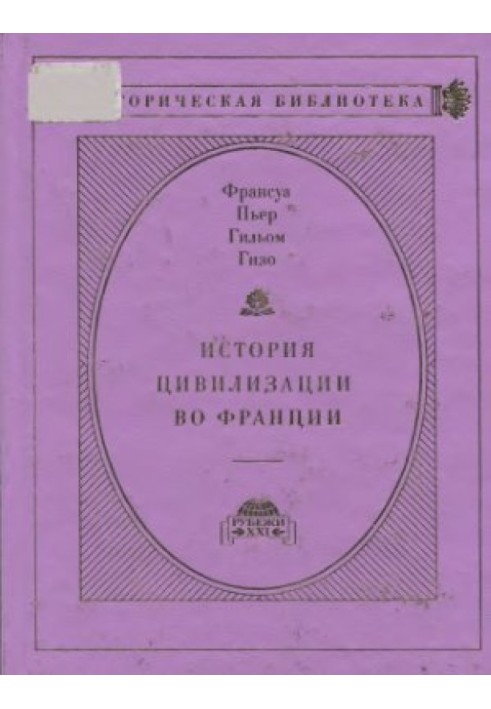History of civilization in France in 4 volumes. Volume I
 Instant download
Instant download
after payment (24/7)
 Wide range of formats
Wide range of formats
(for all gadgets)
 Full book
Full book
(including for Apple and Android)
“The History of Civilization in France,” the fundamental work of the classic of French historiography François Guizot (1787-1874), was at one time an event not only in scientific but also in public life, receiving great resonance in Europe and America. In Russia, its publication in the second half of the 19th century in the translation of the prominent medieval historian P.G. Vinogradova also found a wide response among the educated part of society. And at the beginning of the 21st century, this book has not lost its significance, which gives the right to recommend it to historians, students and everyone interested in the history of the development of world civilization.
CONTENTS: Subject of the course. Two methods that can be used in a detailed study of the history of European civilization. Reasons that make one prefer to study the civilization of one particular people. Reasons encouraging you to choose French civilization for study. What essential facts determine the perfection of civilization. Comparison between the great nations of Europe in this regard. About the civilizations of English, German, Italian, Spanish, French. French civilization is the most versatile and most likely can serve as a representative of the general civilization. Unfair reproaches that civilizations make. Every scientific knowledge is now becoming a social force. Every force should work not only for the improvement of society, but also for the moral improvement of individuals. Why should one study the political state before the spiritual, society before man. About the social situation of Gaul in the 5th century. Imperial administration in Gaul. The fall of the Roman Empire. Society in Gaul. The fall and impotence of civil society in Gaul. The variety of principles and forms of religious society in Europe. Prevailing trends. Facts of major importance in the 5th century. Comparison of civil and religious societies. What should be understood by the moral state of society? Interaction of moral and social states .Comparative table of civil and Christian literature in the 4th and 5th centuries. About the main issues dealt with in Gaul in the 5th century. About Pelagianism. History of Pelagianism in Rome, Africa, the East and Gaul. Pelagius and Caelestius. St. Augustine. The history of the origin of Pelagianism. On predestination. The general nature of literature in the Middle Ages. The question of the nature of the soul in the Christian church. St. Augustine, Nemesius, Mamert Claudian. On the influence on the moral state of Gaul barbarian invasionsAbout the Germanic element in the new civilization.On the opinions of new German writers regarding ancient Germanic society.Essay on the state of Gaul in the second half of the 6th century.The true nature of the invasion of the Germans.Decomposition of Roman societyDecomposition of Germanic societyAbout emerging feudalismFalse idea of Salic law.Is the transitional nature of Salic truth repeated? in the truths of the Ripuars, Burgundians, Visigoths? Continuity of Roman law after the fall of the empire. On the state of the church in Gaul from the 6th to the half of the 8th century. On the unity of the church or spiritual society. The difference between the Western and Eastern Church regarding the persecution of heretics. The predominance and despotism of the episcopate. Struggle parish priests with bishops. Bishops gain the upper hand. The fall of the white clergy. History of the black clergy, or monks, from the 4th to the 8th century. The importance of monks in the West. On the relationship of monks to the clergy from the 4th to the 8th century. Similarities between the struggle of monasteries against bishops and communes against feudal lords Notes (compiled by V.D. Balakin)
Data sheet
- Name of the Author
- Франсуа Гизо
- Language
- Russian
- Translator
- Павел Гаврилович Виноградов
















